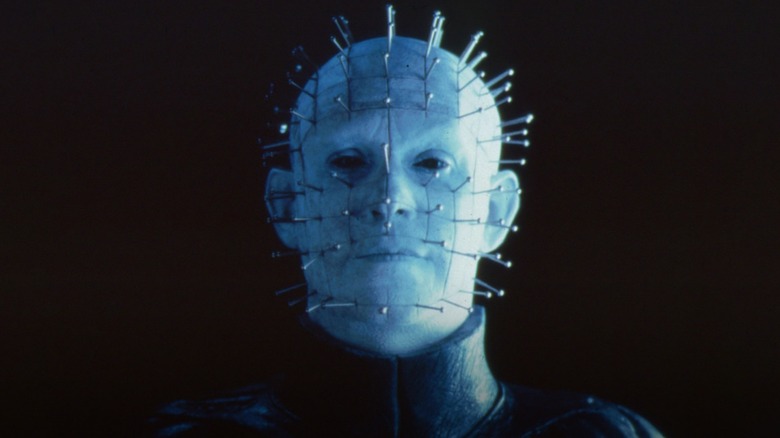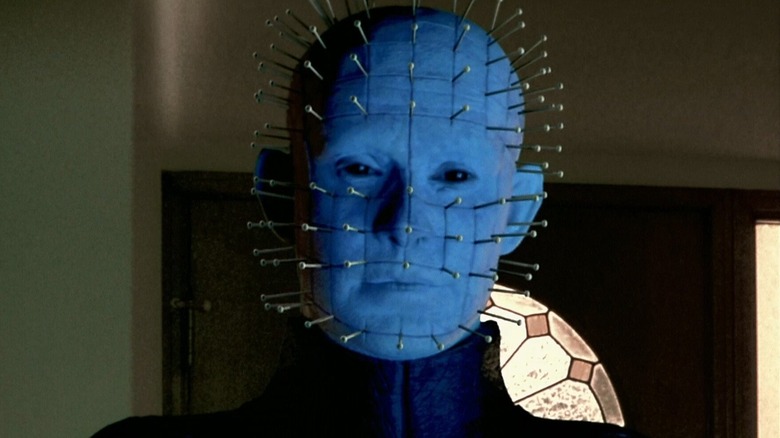One Infamous Horror Sequel Was Very Different Before Scott Derrickson Took Over
We may receive a commission on purchases made from links.
Clive Barker's "Hellraiser" is a modest family drama about Faustian pacts, mysterious puzzle boxes that summon demons, and a wicked stepmother who smooches her skinless brother-in-law in a basement. It also paved the way for an ambitious franchise that's traveled everywhere from New York to outer space. Granted, some poorly received sequels have resulted in the "Hellraiser" movies ranking all over the pleasure and pain scale, but the series still has such sights to show us. The fifth film, "Hellraiser: Inferno," also marked Scott Derrickson's directorial debut, but the project was different before the future Marvel filmmaker took over.
The "Hellraiser" direct-to-video sequels don't have the best reputation among horror fans, as most of them are low-budget afterthoughts that were churned out so Miramax could retain the rights to the franchise. That said, "Inferno" is a compelling noir-inspired detective story that brings a dash of David Lynch-esque surrealism to the "Hellraiser" mythos. The story follows the corrupt cop Joseph Thorne (Craig Sheffer) as he investigates a murderer known as The Engineer, only for his life to unravel after opening one of those aforementioned puzzle boxes. Cue the legendary suffering.
Everyone should give "Inferno" a chance, as it's a creepy little mystery that paved the way for Derrickson to eventually join Marvel and also direct hits like "The Black Phone." At the same time, the abandoned sequel, "Hellraiser: Hellfire," is one of those fascinating what-if stories that could have delivered legendary suffering in its own right.
Hellraiser: Hellfire would have brought the Cenobites to London
Some naysayers argue that "Hellraiser: Inferno" is an unwelcome departure from the previous movies, most notably due to its detective story and Lynchian streaks. However, an alternative take is that it's arguably one of the more Clive Barker-esque stories in the cinematic saga. Barker's books featuring his Harry D'Amour character — who encounters the "Hellraiser" Cenobites in "The Scarlet Gospels" – are horror-fueled detective fiction at its best. Still, some movie traditionalists might have preferred "Hellraiser: Hellfire" to materialize instead, as it would have harkened back to the franchise's Faustian roots.
According to Paul Kane's "The Hellraiser Films and Their Legacy," "Hellfire" was conjured by authors Stephen Jones and Michael Marshall Smith. The story moves the action to London and follows Jack Credence, a businessman and leader of a cult known as The Nine, who makes a pact with Pinhead (Doug Bradley) and the Cenobites for power. Standing in his way is Christine Freely, a bookstore employee who must put a stop to Credence and the forces of Hell after a giant Lament Configuration soars over the city and threatens to unleash Leviathan, aka the Gold of Flesh, Hunger, and Desire.
The original film's protagonist, Kirsty Cotton (Ashley Laurence), would also have returned, with her past Cenobite-induced traumas still troubling her. The writers also hoped to tie up some of the loose ends from previous flicks, but it seems that Miramax wanted a fresh start.
Why Hellraiser: Hellfire never happened
Despite being positively received by Miramax executives and notable "Hellraiser" alumni like Doug Bradley and Peter Atkins, "Hellfire" was shelved in favor of Scott Derrickson's "Inferno." Miramax was impressed by Derrickson and Paul Harris Boardman's script, and the future "Doctor Strange" director was entrusted to helm the feature after shooting some test footage. The rest is history.
Ultimately, "Hellfire" was scrapped as the powers that be preferred Derrickson and Boardman's idea. Of course, the synopsis suggests that "Hellfire" could have been a more expensive movie to make. Stephen Jones and Michael Marshall Smith wanted their story to make the city of London feel like a character, and sprawling, ambitious movies aren't common in the realm of DTV horror. The climactic ending also sounds apocalyptic in scale, and sequences of that ilk require some bucks.
Paul Kane's book notes that "Inferno" was produced for a modest $2 million — a blockbuster budget compared to later sequels. Regardless of which idea was better, though, the film we got put Derrickson on the map, and he's treated us to the scariest movie of all time (according to science!) since then.


